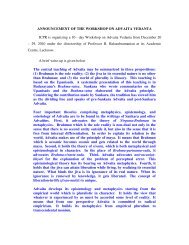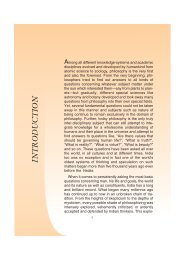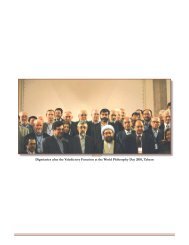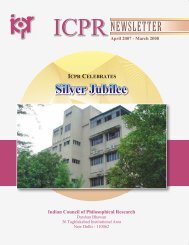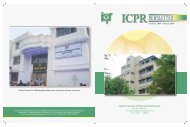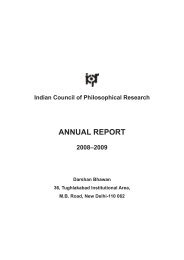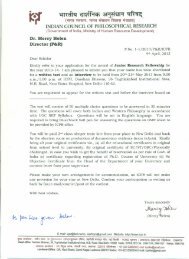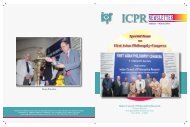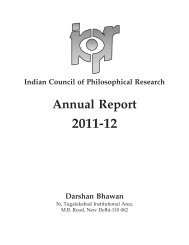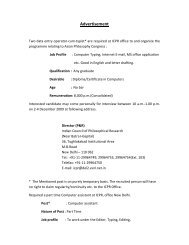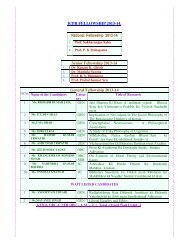(2010- 2011) English - Indian Council of Philosophical Research
(2010- 2011) English - Indian Council of Philosophical Research
(2010- 2011) English - Indian Council of Philosophical Research
You also want an ePaper? Increase the reach of your titles
YUMPU automatically turns print PDFs into web optimized ePapers that Google loves.
Lucknow, Academic Centre<br />
The ICPR in its new Academic Centre not only revived some <strong>of</strong> the old activities, but also revitalized<br />
and rejuvenated the centre with new inputs and programmes. In addition to regular meetings<br />
and conference, several workshops are conducted to tool and train the upcoming scholars and the<br />
ICPR fellows in research methodologies and some obscure but pr<strong>of</strong>oundly important philosophical<br />
problems, contemporary and classical, through discussion and dialogue between subject experts<br />
and the inquisitive students. Also plans are underway to promote local study circles and encourage<br />
regular roundtable discussions on topics <strong>of</strong> current interest.<br />
<strong>Indian</strong> Institute <strong>of</strong> Philosophy<br />
As mentioned in Chairman’s Introduction, another important initiative taken is to make plans<br />
for establishing the <strong>Indian</strong> Institute <strong>of</strong> Philosophy under the auspice <strong>of</strong> the ICPR. The <strong>Council</strong><br />
appointed three different committees to advise it on the structure and modalities <strong>of</strong> establishing<br />
the Institute. A detailed proposal was prepared and submitted to the HRD Ministry for approval<br />
and support. The proposed Institute is envisaged to have a virtual campus and a floating faculty. It<br />
would be autonomous in its functioning, but fully supported by the ICPR. The proposal is under<br />
active consideration <strong>of</strong> the HRD Ministry. This flagship institute <strong>of</strong> the ICPR will obviously be<br />
the home and will have necessary wherewithal and infrastructure for carrying out the mega projects<br />
like <strong>Indian</strong> Identity and National Integration Project<br />
Regional Centres<br />
Again, as described in detail in the Introduction, India with its cultural and linguistic diversity is<br />
home <strong>of</strong> a variety <strong>of</strong> thought systems. Some <strong>of</strong> them are little known beyond a small region. <strong>Indian</strong><br />
culture is not monolithic, but a mosaic <strong>of</strong> an array <strong>of</strong> composite cultures with their own distinctive<br />
identities. Their colourful co-existence is the beauty <strong>of</strong> our nation. Indeed it is our country’s strength.<br />
This can be best preserved by recognizing the due place <strong>of</strong> each <strong>of</strong> these cultures in our national ethos.<br />
Cross-regional circulation <strong>of</strong> ideas is an important step in ensuring enduring national integration.<br />
With this objective and in accordance with the recommendations <strong>of</strong> the Committee constituted<br />
to advise us on this, the ICPR prepared a blue print to have a network <strong>of</strong> regional centres. The<br />
proposal is under the consideration <strong>of</strong> the HRD Minister.<br />
Inter-Institutional Synergy, Inter-disciplinary and Cross-Cultural Studies<br />
Another new initiative is to work with other institutions to promote philosophical activity in the<br />
country. What began as a combined effort to conduct joint seminars designed by ICPR grew to be<br />
an important undertaking to involve other institutions to develop long term research strategies and<br />
projects. ICPR conducted several national seminars/conferences with financial support from and<br />
21



